Public Adjuster Fort Lauderdale
Home » Public Adjuster Fort Lauderdale
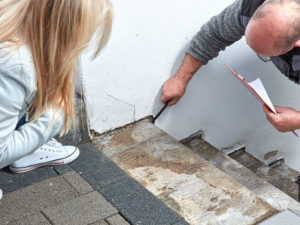
If you’ve suffered any type of property damage, residential or commercial, it’s in your best interest to work with a premier Fort Lauderdale Public Adjuster from ProFloridian Claims Consultants. Our top-notch professional public adjusting firm will work exclusively for you and support you throughout the claim process.
ProFloridian Claims Consultants is a licensed and most trusted public adjusting firm serving all of Fort Lauderdale and the nearby areas. Our firm helps homeowners, business owners, renters and property managers receive maximum compensation for property damage claims.
We are experts in the following damage types: denied claims, hurricane damage, fire damage, water damage, wind damage, fallen trees, smoke damage, mold damage, snow & freeze, roof damage, theft/vandalism damage, hail damage, and income loss damage.
Get a FREE claim analysis by contacting us NOW!
Call us on (954) 588-7416 for a free claim analysis.
Do you need representation for a property insurance claim in the Fort Lauderdale? If so, then consider hiring a certified public adjuster from ProFloridian Claims Consultants. We’ll appraise the value of your property damage and negotiate a fair insurance claim settlement on your behalf with the insurance company. Call 954-588-716 for a free claim analysis.
We Get Paid, When You Get Paid!
ProFloridian Claims Consultants
2598 E. Sunrise Blvd Suite 2104
Fort Lauderdale, FL 33304
Latitude: 26.137850
Longitude: -80.110840
ProFloridian helps with:
Public Adjuster FAQs
Denied Claims
Has your property damage claim been denied? If it has, you might think that’s the end of your case, but it is not. You have the right to appeal the insurance company’s decision and fight for a reversal of the denial. That’s where our services can be of great use to you.
ProFloridian Claims Consultants are property-claim adjusting service providers that can represent you in a claim denial case. The first thing we’ll do is send one of our public adjusters to review the evidence and damage. Then, we’ll compare our findings to the findings of the insurance claim adjuster. If there are discrepancies or inconsistencies between the two findings, we will contact your insurance company and provide our findings to them.
Since they won’t want to risk a lawsuit for denying your claim unfairly, they will likely reverse their claim denial decision and negotiate to give you a fair settlement. Insurance companies tend to get intimidated by policyholders who are represented by professionals.
Of course, we recommend that you contact us before attempting to file a property damage claim with your insurance company. This will increase the likelihood of a favorable outcome.
Water Damage Fort Lauderdale Public Adjuster
Water damage can happen after a big storm outside or when your pipes spring a small leak. It doesn’t take much water for a house to suffer water damage. Your walls, ceilings, and floors are all highly susceptible to water damage.
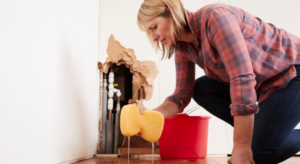
Our public adjusters can assess the level of water damage in your home and review the mitigating circumstances surrounding it. If the water damage was found to be unavoidable, we’re confident we can present a strong case to your insurance company as to why they should honor your water damage claim.
Fire Damage
Fire damage is usually severe when it happens in a home. Common causes of fire damage include kitchen accidents from cooking, natural wildfires, lit cigarettes not properly discarded, and arson. The exact cause of the fire damage determines whether the insurance company will approve a fire damage claim or not.
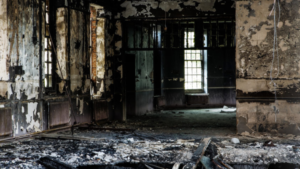
Our public adjusters will want to determine the cause of the fire damage first. We’ll review the police and fire reports before coming to our own conclusions. Based on the available evidence, we will present a case in your defense to the insurance company to get you full compensation for your fire damage claim.
Hurricane Damage
Florida is known for its hurricanes, especially over the last five years. It seems like hurricanes are now an annual event . If your house is ever in the path of a monstrous hurricane and suffers damage from it, then you deserve compensation from your insurer. After all, what else could you have done to stop the hurricane? Not much.
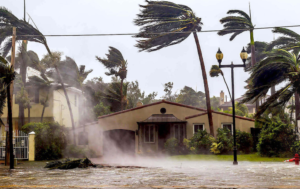
We have a near-perfect success rate in getting hurricane damage compensation for our clients from insurance companies. Hire us today for assistance with your hurricane damage claim.
Hail Damage
Did you know it can hail in Florida? In fact, many of our clients have experienced damage to their homes because of a hailstorm. Most of the damage occurs to their roof, because hailstones hit shingles pretty hard.
If you incurred roof damage or any other property damage because of a hailstorm, we won’t have any problem convincing your insurance company to approve your hail damage claim.
Wind Damage
Wind damage often coincides with hurricanes and tropical storms. However, your home may also experience wind damage from winds that are no stronger than 25 mph. Florida gets surprise windstorms throughout the year. Any type of wind damage incurred by your home will entitle you to property damage compensation from your insurance company.
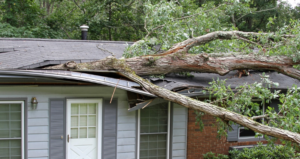
Contact our experienced public adjusters for assistance with your wind damage claim today.
Roof Damage
Roof damage can happen from windstorms, hurricanes, or objects falling onto your roof. It’s important to repair damaged roofs quickly to prevent rain from leaking into your home.
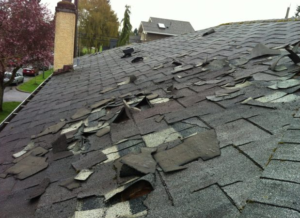
Our public adjusters will assess your roof damage and prove to the insurance company that an act of nature caused the damage and that you deserve to have your insurance claim approved.
Contact our experienced public adjusters for assistance with your roof damage claim today.
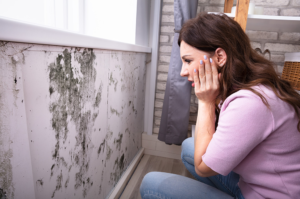 Mold Damage
Mold Damage
Mold damage is one aftereffect of roof damage and/or water damage. Florida is already hot and humid. If too much moisture builds up in your home, mold will grow very quickly.
Insurance companies are hesitant to approve mold damage claims. You must be able to prove the mold was caused by an incident such as a storm or burst pipe. We can gather this kind of evidence and work to convince your insurance company that your mold growth was not an ongoing problem.
Loss Damage
Do you own a business that suffered lost income because of hurricane damage, vandalism, or some other unavoidable occurrence? If so, then our public adjusters will ensure your insurance company reimburses you for a percentage of your lost revenue based on the coverage described in your insurance policy agreement.
Contact our experienced public adjusters in Fort Lauderdale for assistance with your income-loss damage claim today.
Theft/Vandalism Damage
You can never predict when theft or vandalism might occur on your property. The resulting harm might be a broken window – or a substantial financial loss. After you call the police and file a police report, your next step should be to call our public adjusters. Let us help you file a theft/vandalism damage claim and ensure your insurance company won’t deny it.
Contact Us Today
Contact us for more information, call (954) 588-7416 today and get the compensation you deserve for your property insurance claim!
Fort Lauderdale property damage statistics
Fort Lauderdale homeowners deal with countless property damage situations where a public adjuster is needed. The home repair expenses are sky-high, and filing a claim to the insurance company is a better idea. Fort Lauderdale, Florida, is home to the destructive Hurricane Season, which results in many hurricane damage claims. Other property damage claims aren’t uncommon either, such as water damage, fire damage, mold damage, roof damage, etc. The property damage statistics show an interesting picture!
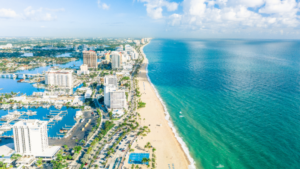
Average insurance claim in terms of severity
From 2014 to 2018, homeowners in Florida reported wind and hail claims most frequently, followed by water damage and freezing, fire and lightning, theft, etc. The financial losses following property damage look like this:
- Fire and lightning property damage – $79,785 in losses
- Bodily injury and property damage – $26,872 in losses
- Wind and hail – $11,200 in losses
- Water damage and freezing – $10,894 in losses
- Theft – $4,391 in losses
- All other property damage – $6,592 in losses
Homeowners insurance claims frequency
About 5.7% of insured homes in Florida filed a property damage claim in 2018, compared to 6.4% in 2017. Moreover:
- Wind and hail claims are the most common
- One in 20 insured homes files a claim each year.
- One in 40 insured homes files a wind or claim each year in Florida.
- One in 50 insured homes files water and freezing damage claims each year.
- Approximately one in 350 insured homes reports fire or lightning property damage to insurance companies.
Florida ranks second in terms of average homeowner insurance premium, at $1,951, and it’s only topped by Louisiana with an average premium of $1,968. Moreover, the statute of limitations regarding property damage in Florida is four years.
What types of homeowners’ insurance policies are available in Fort Lauderdale?
Fort Lauderdale has eight types of homeowner insurance policies, as follows:
- HO-1 insurance policies are very common, and they only cover named perils such as hail damage, windstorm damage, fire damage, etc.
- HO-2 policies are broader than the HO-1s, covering more named perils such as electrical damage, heating damage, and damage related to falling objects.
- HO-3 policies are special forms that only include an exclusion list. The policy covers every peril that isn’t listed in the exclusion list.
- HO-4 insurance policies are only used by renters, and they cover only personal belongings and liability.
- HO-5 policies are more comprehensive and more expensive than HO-1s, HO-2s, and HO-3s. However, they cover other damage types such as mold, water, and flood damage.
- HO-6 insurance policies cover personal liability and belongings for condominium owners.
- HO-7 policies are specific to mobile homeowners.
- HO-8 insurance policies are almost identical to HO-3 policies, only that they apply to older homes. Moreover, insurance is equal to the home’s market value.
Depending on the insurance policy you have, the insurance company may or may not cover your property damage.
Should I hire my own local Fort Lauderdale public adjuster?
You should hire your own insurance adjuster if you’re dealing with a catastrophic situation such as hurricane damage or water damage. These types of claims are always complicated because they’re worth a lot of money. Because of this, insurance companies do not want to pay the claims too quickly. Their so-called investigations will drag on for months so they can delay paying the claim.
When you hire an insurance adjuster to negotiate with the insurance company, there will be less stonewalling by the latter. Choose an insurance adjuster who is experienced and holds the proper credentials for your state. If they have a reputation for helping clients get insurance claims approved, there’s no reason why they can’t do the same for you.
When they examine roofs, what do insurance adjusters look for?
Roof damage is common after a windstorm, snowstorm, hailstorm, or hurricane. When an insurance adjuster investigates a roof for damage, they’re looking for six specific types of damage: missing granules on shingles, dented metal vents, damaged or missing shingles, leaky areas, and gutter damage.
Insurance companies want to verify the roof damage wasn’t a preexisting condition. That’s why they also look for damage to other parts of the house – such as the windows, HVAC system, or fencing. If these also appear to be recently damaged, it’s easier to argue that same storm that damaged them also damaged the roof.
If you only have roof damage and no other damage, especially after a hurricane, it may seem suspicious to the insurance adjuster. Of course, the one exception is if a tree branch or an entire tree were to fall on your roof. This would obviously be more believable, and other signs of damage in or around your home would be needed to prove your claim.
What happens when a public adjuster comes to your house?
When you file a claim with your insurance company, they will respond by sending an insurance adjuster to your house. The adjuster will inspect the property damage to determine its severity. Their job is to determine the legitimacy of the claim and the value of the damage.
Once they provide this information to the insurance company, a decision will be made whether or not to approve your claim. If the claim is approved, you will receive a check for the settlement amount. This should match the cost of repairing the damage. Sometimes the insurance company will pay the repair person directly.
A public (or private) adjuster works for you, so you decide when you want to call them. It’s best to call before you file a claim, because this allows them to collect evidence before the insurance adjuster does.
Who pays when you request a public adjuster?
Public adjusters charge different amounts, depending on where they’re located and the local laws. Usually, a public adjuster won’t charge anything for the initial visit to a policyholder’s house to investigate damage. If the policyholder decides to hire the public adjuster, a small fee might be charged to file their claim (given, the claim hasn’t already been filed).
After the claim is filed, the public adjuster works with the insurance company to determine a fair settlement amount for the policyholder. Once the policyholder and insurance company agree on the settlement, then the latter pays the claim. The public adjuster receives a percentage of that claim.
It is the policyholder’s responsibility to pay the public adjuster after they receive their settlement payment. For instance, let’s say the claim settlement amount is $100,000 and the public adjuster charges a 10% commission, the policyholder will owe $10,000 to the public adjuster.
